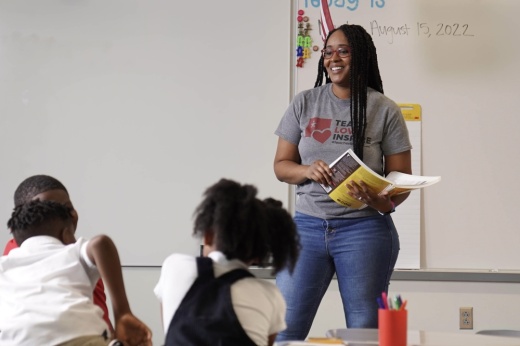Fort Bend ISD passed its 2023-24 budget in a June 26 meeting due to Texas Education Agency requirements that districts prepare a budget by June with a July 1 fiscal year start.
“We’re approving these budgets today because we have to, and we’re still essentially pending what the state Legislature [is] going to do,” FBISD Trustee Kristen Malone said at the meeting. “This [budget plan is] likely going to be amended in the near future.”
District officials said increased pay for staff hinges on receiving adequate financial support from the state or an increased tax rate.
The state entered the 88th Legislature with nearly $33 billion in its reserves and a list of funding plans for public schooling. However, beyond a few small examples, larger funding bills have yet to materialize, said Bob Popinski, senior director of policy for Raise Your Hand Texas, a nonprofit education advocacy group.
“It was a session out of balance,” Popinski said. “It was absolutely surprising. ... All the recommendations ended up failing.”
Local effects
After passing a nearly $1 billion barely balanced overall budget, FBISD officials are cautiously waiting to see how—and if—the state will provide financial assistance.
FBISD Deputy Superintendent Steven Bassett said the starting teacher salary of $59,500 is remaining the same in 2023-24 as the previous year because the district does not have the funds to increase compensation.
“Part of the reason that we’re focusing on the compensation aspect is because that’s obviously what recruits and retains staff,” he said. “And so without the state making any movement to adjust teacher salaries, we’re in that same situation going into next year.”
At a July 24 meeting, the district discussed a potential voter-approval tax rate election, or VATRE, to pay for increased teacher compensation. The last VATRE held by FBISD in 2022 did not pass, with 54% of respondents voting against the district’s effort to maintain a higher property tax rate and avoid a budget shortfall.
If successful this time, a potential VATRE would increase the tax rate by 2 cents, or $54 dollars per year. Simultaneously, the district also estimates that the state’s recent property tax bill Senate Bill 2 could reduce taxes by $997 per household if it passes in November.
“We have one of the lowest tax rates in the entire area; this is one of the reasons why we don’t have the revenue that others do,” Superintendent Christie Whitbeck said.
She said the potential new rate would “not be much of a difference.”
Chief Financial Officer Bryan Guinn said past efforts by the state to increase teacher compensation to improve retention, such as the failed House Bill 100 in the regular session, were “insignificant.” The failed legislation would have increased FBISD teacher salaries by about $500, or 0.8%, he said.
“We just don’t believe that it’s financially prudent to adopt a deficit budget to fund teacher raises without an offsetting revenue,” Guinn said. “The amount that [the state was] proposing was woefully inadequate for teacher raises.”
FBISD, which projects general fund expenses of $766.6 million, passed the general fund portion of the budget with a small surplus of just over $1 million. State revenue makes up $236.3 million of the district’s FY 2023-24 general fund, or about 30.8% with local property taxes making up a majority of the remainder, Director of Strategic Communications Sherry Willams said.
The general fund is the largest portion of the overall $940.8 million budget, which also includes the debt service and child nutrition funds. The general fund is spent on district operations, instruction and staff compensation.
Guinn said while the state has not provided much additional funding support for schools, it has passed down various mandates to districts over the past three legislative sessions while supplying little to no financial support to pay for the items.
Some of the partially or fully unfunded mandates the state has required of schools include a reading academy, full-day pre-K, special education programs and additional tutorials, and police officers on campuses. Guinn emphasized the importance of these items but said FBISD is in dire need of financial support to cover them.
“They’re requiring us to do it, and they’re not giving us anything,” he said.
Guinn said in light of the state’s historic $33 billion surplus, he hopes to see an increase to the state’s basic allotment and assistance with some of the mandates—especially special education, which he described as “perennially underfunded.” The program costs FBISD about $36 million per year, according to budget documents.
“We are hopeful that these issues will receive the additional attention they deserve to ensure our schools are well funded and preparing all students for future success,” Guinn said.
Zooming out
Multiple school districts across the state are either proposing or approving budget shortfalls for the 2023-24 school year. This is due to a number of economic factors, such as inflation, which has driven up operating costs, as well as state and federal money tied to the COVID-19 pandemic drying up, Popinski said.
Nearly all proposals aimed at increasing school funding in the legislative session ended up on the cutting-room floor, Popinski said. Among those proposals included an increase to teacher pay and the per-student allotment funding given to school districts.
The per-student allotment sits at $6,160 and has not been increased since House Bill 3 passed in 2019, Popinski said. The state would need to add roughly $1,000 this year to the allotment to match inflation that’s happened since the last increase.
Due to high rates of inflation in recent years—totaling about 18.5% from April 2019-April 2023, according to the Texas comptroller’s office—school districts have had trouble keeping up with rising costs of their operations.
Houston ISD, which is in the middle of a takeover from the state, approved a $2.2 billion budget June 22 with a $168.5 million shortfall.
The story rings much the same at Cy-Fair ISD—the state’s third-largest school district—which passed in June a $1.21 billion budget with a roughly $138.6 million shortfall.
CFISD Superintendent Mark Henry said his district’s newest budget was the most difficult to prepare in his 32-year career.
“It’s irresponsible and insidious what the state is doing to public education right now,” Henry said at the district’s June 20 meeting.
On the state side, many funding bills failed because of efforts to tie them to a private school voucher program as part of Gov. Greg Abbott’s goal to make private institutions more affordable to families in Texas. The program lacked support from both the House and Senate, blocking many bills from passing that otherwise might have had the needed votes, Popinski said.
What happens next?
Andrew Mahaleris, a spokesperson for Abbott, said in a July 6 emailed statement to Community Impact that more money will be available to districts when the state passes the school choice legislation, adding it’s an effort to “empower parents.”
“Gov. Abbott has prioritized public education funding and support for our hardworking teachers throughout his time in office,” Mahaleris said in the statement.
The House and Senate came to an agreement in July on property tax legislation that would spend $12.6 billion of the state’s surplus on buying down school district tax rates by about 10.7 cents. School districts are typically the highest-taxing local entities compared to cities and counties.
Guinn said “no one” would protest reductions to tax bills but expressed disappointment that the state’s remaining nearly $33 billion surplus has not yet been directed toward schools. He said FBISD officials are “very concerned” the state has not successfully addressed “critical” issues.
FBISD board members have until Aug. 21 to call the VATRE for November. Officials showed support for conducting a public opinion survey on the topic before taking action, similar to the survey for the last bond.
There is still time for the state Legislature to pass something. The state is working through special sessions right now, which could include some school funding bills, Popinski said.
In the meantime, with shortfalls and a growing need to increase teacher compensation, many districts will likely be dipping into their reserves to make ends meet, Popinski said.
“School districts are in a pretty tough position going forward,” he said.





